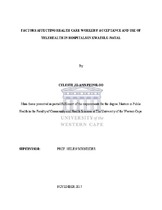| dc.description.abstract | Background and rationale: Telehealth is a collection of methods for enhancing health care,
public health, and health education delivery and support using telecommunications technologies.
Despite the many reported benefits of telehealth, there are challenges to its continued and
widespread use in South Africa. It remains unclear what facilitates or hinders the integration of
telehealth into routine clinical practice.
Study aim and objectives: Drawing on the Unified Theory of Acceptance and Use of
Technology (UTAUT), this study investigated factors affecting healthcare workers' acceptance
and use of telehealth in hospitals in KwaZulu-Natal (KZN). Specifically, it described the
frequency and nature of telehealth use and the factors associated with technology acceptance;
and evaluated the influence of socio-demographic factors (age, experience, profession,
qualification) and acceptance factors on use and behavioural intention to use telehealth.
Methods: A quantitative survey in seven hospitals (2 tertiary, 3 regional, 2 district) with
telehealth facilities falling under the KZN Department of Health, was conducted. 177 medical,
nursing, pharmacy and allied staff consented to complete an on-line, closed ended and structured
self-administered questionnaire based on the UTAUT model. The responses to the individual
likert scale items were assigned a score (1-4), and from this, total scores calculated for each
construct. Respondent characteristics were converted into binary variables and associations with
total scores on each of the UTAUT acceptance domains were tested using t-test. The associations
between behavioural intention and actual use (as binary dependent variables); and the respondent
profiles, scores for performance expectancy, effort expectancy, social influence, and facilitating
conditions (independent variables) were assessed in two multivariate logistic regression models. | |

